Varshitap Rahasya Yatra
Added to library: September 2, 2025

Summary
Here is a comprehensive summary in English of the Jain text "Varshitap Rahasya Yatra" by Priyam:
This book, "Varshitap Rahasya Yatra" (The Secret Journey of Varshitap), by Priyam, published by Ashapuran Parshwanath Jain Gyanbhandar, delves into the profound and multifaceted meaning of Varshitap, a significant Jain austerity. The author argues that the common understanding of Varshitap as merely 400 days of fasting after the Lord's initiation is a limited and incomplete definition. The book posits that true Varshitap is a lifelong practice that began much earlier in the Lord's past lives, encompassing not just physical fasting but a deep spiritual and ethical transformation.
The book systematically explores thirteen core aspects of Varshitap, illustrated through the past lives and actions of Lord Rishabhdeva (Adinath) and other significant figures. These thirteen aspects are presented as "secret journeys" of Varshitap:
-
Udarya Varshitap (Generosity): This begins with the life of Dhana Sarthavaha (merchant). True generosity, the book explains, isn't just giving but a spontaneous, unconditional offering of resources, help, and even protection to others, anticipating their needs without expecting anything in return. It's about prioritizing others' well-being, choosing the last in line, uplifting others, and sharing the best one has.
-
Gambhirya Varshitap (Seriousness/Depth): This aspect emphasizes maintaining emotional equanimity in the face of happiness or sorrow. It's about having a profound depth of mind that doesn't get easily disturbed by external events, likening it to a lake that remains unaffected by a small amount of salt, unlike a glass of water. True depth means not letting external circumstances rule over one's inner state.
-
Dhairya Varshitap (Patience/Fortitude): This highlights the importance of a controlled intellect (marganusari buddhi) that guides actions for both worldly and otherworldly benefit. It means not succumbing to temptations or setbacks and remaining steadfast in one's spiritual path. True patience involves continuously thwarting negative inclinations.
-
Aho-bhav Varshitap (Admiration/Reverence): This focuses on developing a sense of deep admiration and reverence towards spiritual guides, virtuous qualities, and those who uphold them. It's about experiencing genuine awe and joy in the presence of spiritual purity, as exemplified by Dhana Sarthavaha's reaction to the presence of Acharya Dharmaghosha.
-
Supaatra-daan Varshitap (Giving to the Worthy): This emphasizes the meticulous and heartfelt offering of alms to mendicant monks. It illustrates the joy and spiritual fulfillment derived from finding worthy recipients and offering them sustenance with utmost care and devotion, even when resources are limited, as seen when Dhana Sarthavaha offered ghee to monks.
-
Samadhi Varshitap (Mental Equanimity/Concentration): This is described as the breath and soul of Varshitap. It's not just about abstaining from food but maintaining a state of profound mental peace and concentration, independent of external means or comforts. True happiness is found only in samadhi, which is complete self-reliance and joy derived from within, irrespective of possessions.
-
Samanorath Varshitap (Noble Aspirations): This refers to developing pure and elevated desires for spiritual progress, such as the aspiration to attain the monastic life. It highlights that truly noble aspirations are rare, especially for those with limited spiritual understanding. It's about yearning for spiritual truths rather than worldly achievements, even at the cost of material prosperity.
-
Shramano-pasana Varshitap (Service to the Ascetics): This is presented as the foundation of inner austerity. It emphasizes that true devotion and austerity are centered around serving monks and nuns, mirroring their suffering, joy, and well-being. A layperson (shravaka) is fundamentally a servant of ascetics (shramano-pasaka), and without this service, their spiritual life is incomplete.
-
Vairagya Varshitap (Detachment/Renunciation): This highlights the profound detachment from worldly possessions and pleasures, even when surrounded by immense wealth and comfort. It's not just the absence of attachment but an active disinterest, viewing worldly glories as fleeting and ultimately unsatisfactory. The book argues that without detachment, even religious practices are hollow.
-
Visha-sthanak Varshitap (Worship of the Twentyfold Path): This focuses on the systematic cultivation of twenty virtues or principles, which are the core of the spiritual path. The author critiques the common perception of this as merely an external penance, explaining that the true essence lies in actively practicing each of these twenty elements, ranging from reverence for Arihants to propagating the faith.
-
Tattva-chintan Varshitap (Contemplation of Truths): This involves deep introspection and philosophical inquiry into the nature of reality, the self, and the consequences of actions. It's about seeing the transient and often unpleasant aspects of the material world and using this insight to foster detachment. The book emphasizes that true contemplation is a result of consistent study of Jain scriptures.
-
Nir-mamata Varshitap (Absence of 'Mine-ness'): This refers to the state of being completely free from the sense of possession and personal claim, even over one's own lineage or possessions. It illustrates this through the Lord's non-reaction to his grandchildren's pleas for their share of the kingdom, demonstrating a pure detachment from all worldly relationships and belongings.
-
Char-so Nirjal Upavaso (Four Hundred Waterless Fasts): This is the commonly understood aspect of Varshitap but is presented with a deeper perspective. It emphasizes that the Lord's fasts were not out of helplessness but a demonstration of immense willpower and self-respect. The author contrasts this with the common understanding of fasting, which often focuses on physical comfort and anticipation of the end of the fast, rather than the spiritual purpose of karma annihilation. The example of Shreyanshkumar's offering of sugarcane juice highlights the importance of complete surrender and selfless giving.
The book concludes by stressing that true Varshitap is a blend of external austerity and internal transformation. It encourages readers to emulate not just the fasting of the Lord but also his virtues, aiming for a holistic approach to spiritual practice. The author urges a lifelong commitment to these principles, viewing them not as mere rituals but as the path to immense spiritual wealth and ultimate liberation. The text warns against superficial observance, emphasizing that true attainment comes from integrating these thirteen "secret journeys" into one's life.